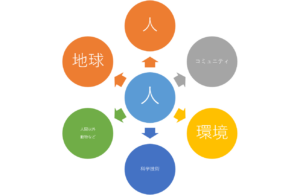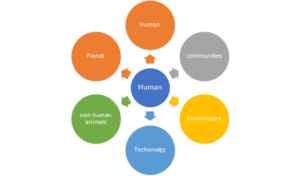共生教育論
共生とは「共に生きる」。共生学では様々な場面で共に生きる人々について考えていきます:

共生教育論、共生教育学が焦点をあてるのはまさに人々の生き方そのものです。私たちを取り巻く環境との関わりのなかで、私たちは意識的にあるいは無意識に膨大な量の情報を処理し、それらに基づいて対応・意思決定を行います。ですから、共生教育論についてかんがえるということは、フォーマルなあるいはアンフォーマルな両方の環境においていかに学んでいくのかを考え、様々な生き方を通し学ぶということなのです。
共生教育論は教授の山本ベバリーアンと准教授のクリスチャン・エツロットが担当し、様々な国の学生が共に英語で学び、議論をしています。これは私たちの研究室の一つの特徴で、現在のところ、日本、イラン、中国、ベトナム、カナダ、アメリカ、イスラエルそしてエジプトからの学生がいます。様々な国の学生や教授と共に学びたいと考えるのであれば、私たちの研究室は願ってもない場となるはずです。もちろん、十分な英語運用能力は必要となります。
担当教員の二人は共に社会学者です(クリスチャン・エツロット先生は経済学でPhDを取得していますが)。社会学者として、二人は様々な方法論を用い、異なるテーマの研究をしています。
山本ベバリーアンは教育、健康、ジェンダー、セクシャリティ、多文化、ダイバーシティ(多様性)そしてインクルージョン(包摂)に焦点を当てた研究を行っています。現在では、大阪大学ユネスコチェアのチェアホルダーを務めています。チェアは、7か国による包括的性教育(CSE)の研究、プラネタリーヘルスのネットワーク探求、青少年の健康とウェルビーングをはじめ様々なプロジェクトに関わっています。青少年の健康とウェルビーングはWHO神戸オフィスとの共同プロジェクトです。さらに現在多くの時間を費やしている研究が医療における患者・市民参画(PPI)です。医療へのAI技術導入における患者・市民参画(PPI)に関するプロジェクト(英国オックスフォードとの共同研究)の研究代表者であります。また、大阪大学大学院医学系研究科の加藤和人が研究代表を務める研究プロジェクトの共同研究者として、希少疾患に関する医療研究と医療政策決定におけるPPIの有用性を探究する2つの研究を行っています。
エツロット・クリスチャンは西洋・非西洋社会学理論に焦点を当てた研究を行っています。現在は、資本主義と並んで、家父長制、白人至上主義、帝国、異性愛、能力・才能を理論化することに関心があります。これらのトピックスは、研究関心である大衆教育(暗記に重点を置く)とエリート教育(批判的思考に重点を置く)、多文化教育(異文化の共存に重点を置く)とグローバル・シティズンシップ教育(コスモポリタン文化に重点を置く)間の不安定な関係についての教育と関連性があります。さらに、グローバル化へのエリートネットワークの影響と金融システム改革の戦略についても分析しています。
好奇心旺盛で柔軟な考えを持ち、新たな社会科学の領域を探究したいと考えるみなさまを歓迎します。
Critical Studies in Transformative Education
In our neoliberal age, we value youth, beauty and success highly. As long as we are young, beautiful and successful, we become intoxicated by the belief in our omnipotence. We are so full of ourselves that we are forgetting other people, who are not in their prime, are less beautiful and less successful. We neglect the fact that we all have bodies, which decay, and that we all live on the same planet, which suffers under the human footprint. We rarely realize that we have shared vulnerabilities. And even if we do recognize these vulnerabilities, we try to reduce the risk for ourselves. Instead we could emphasize the similarities between us and could try to solve these problems for all of us based on the insight that these vulnerabilities are shared. We could accept that the precarity of life affects us all. By focusing on the similarities rather than the differences, we might be able to build societies based on empathy and solidarity. Kyousei kyouikuron or kyousei educational studies have the aim to find ways of how education can help us to live in peaceful coexistence together.
Kyosei 共生 is a Japanese word that combine the Kanji for living 生 and together 共. In Kyosei Studies we are thinking about human living together at a number of levels:

So what is our focus in 共生教育論 or Kyosei Studies in Education for Transformation.
Learning is at the heart of living. As we interact with our environment, those around us, we are consciously or unconsciously processing huge amounts of information and reacting or making decisions on the basis of this information. So when we think about ‘education for transformation’ we are thinking how we learn both in formal and informal settings, and learning across the life course.
Kyosei Studies in Education for Transformation is led by two professors, Beverley Yamamoto and Christian Etzrodt, but is made up of a diverse group of undergraduate and graduate students who meet to learn and discuss research in English. So that is one distinguishing feature of our lab. Currently there are students from Japan, Iran, China, Vietnam, Canada, United State of America, Israel and Egypt. So if you want to study with students and professors from different parts of the world, you might want to consider our lab. But you do need to have sufficient English proficiency to keep up!
Next, both professors are sociologists, although Christian also has a PhD in Economics. As sociologists we are working on different themes, using a variety of methodologies.
Beverley’s research has focused on education, health, gender, sexuality, multiculturalism, diversity and inclusion. Currently she leads the Osaka University UNESCO Chair in Global Health and Education. The Chair is involved in a number of projects, including a seven country study of Comprehensive Sexuality, an investigation of networks around planetary health, and the health and wellbeing of adolescents. The latter is a project with the WHO Kobe Office. The other major area taking up Beverley’s time at the moment is Patient and Public Involvement (PPI). She is leading a PPI project on the implementation of AI technologies in health care that is a joint research with the University of Oxford. She is also a co-investigator on two projects led by Professor Kazuto Kato in the School of Medicine also exploring the efficacy of PPI in medical research and medical policy making for rare disease.
Christian’s research has focused on Western and non-Western sociological theories. He is now interested in theorizing patriarchy, white supremacy, empire, heterosexuality, and ability alongside capitalism. This topic is related to his research interests in education about the uneasy relationship between the education for the masses (with a focus on memorization) and elite education (with a focus on critical thinking) on the one hand, and multicultural education (with a focus on the coexistence of different cultures) and global citizenship education (with a focus on a cosmopolitan culture) on the other. He is furthermore analyzing the influence of elite networks on globalization and possible strategies of reforming our banking system.
We are looking for students who are curious and open-minded, who want to explore with us the frontier in the social sciences.